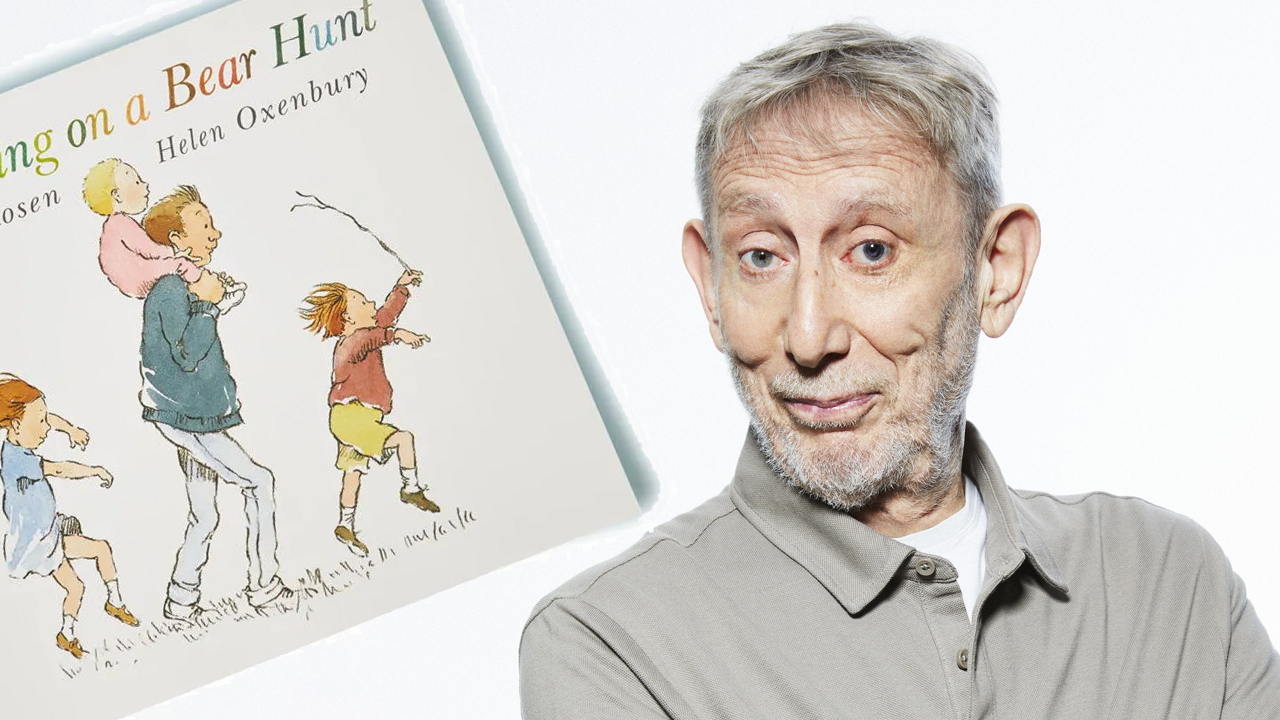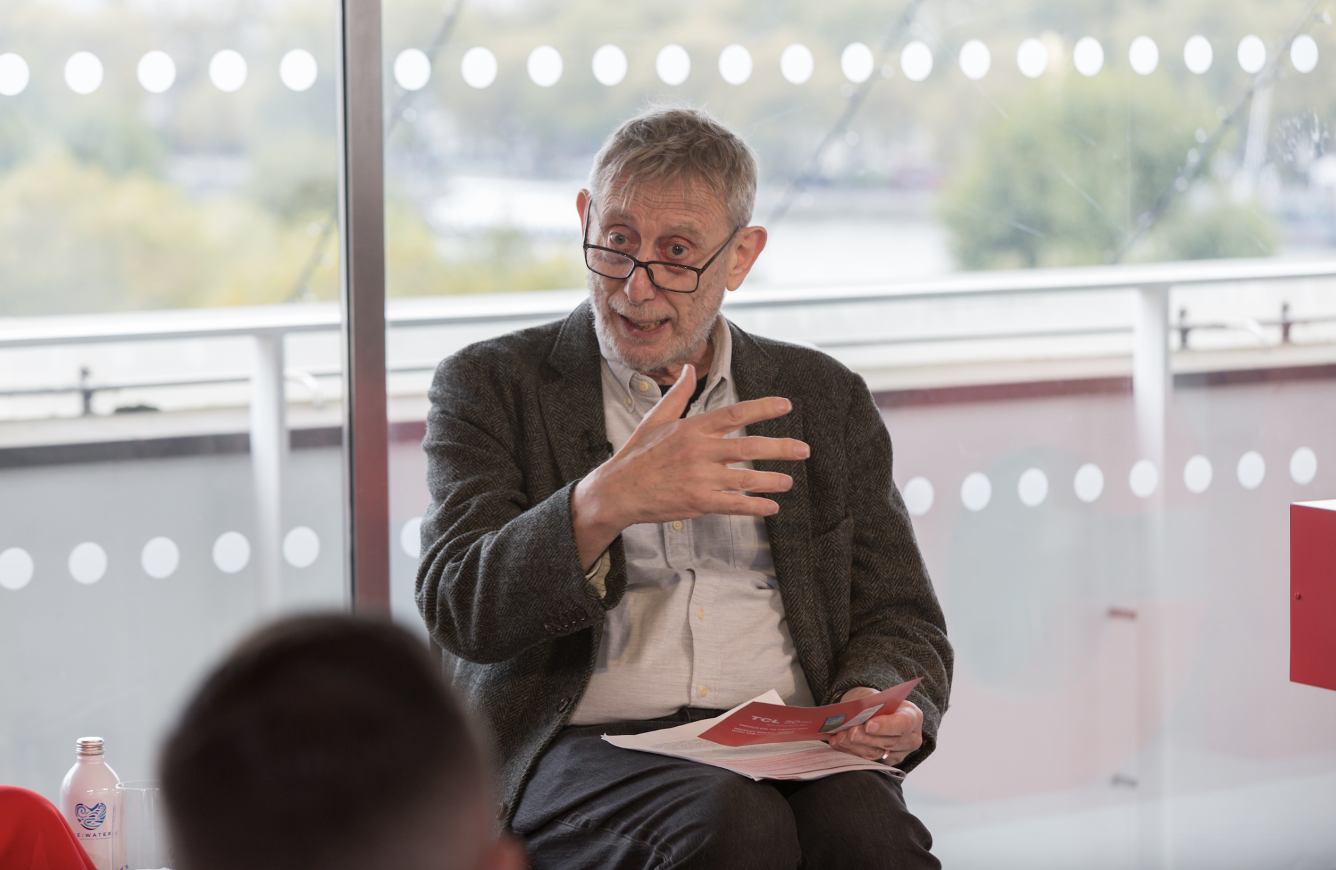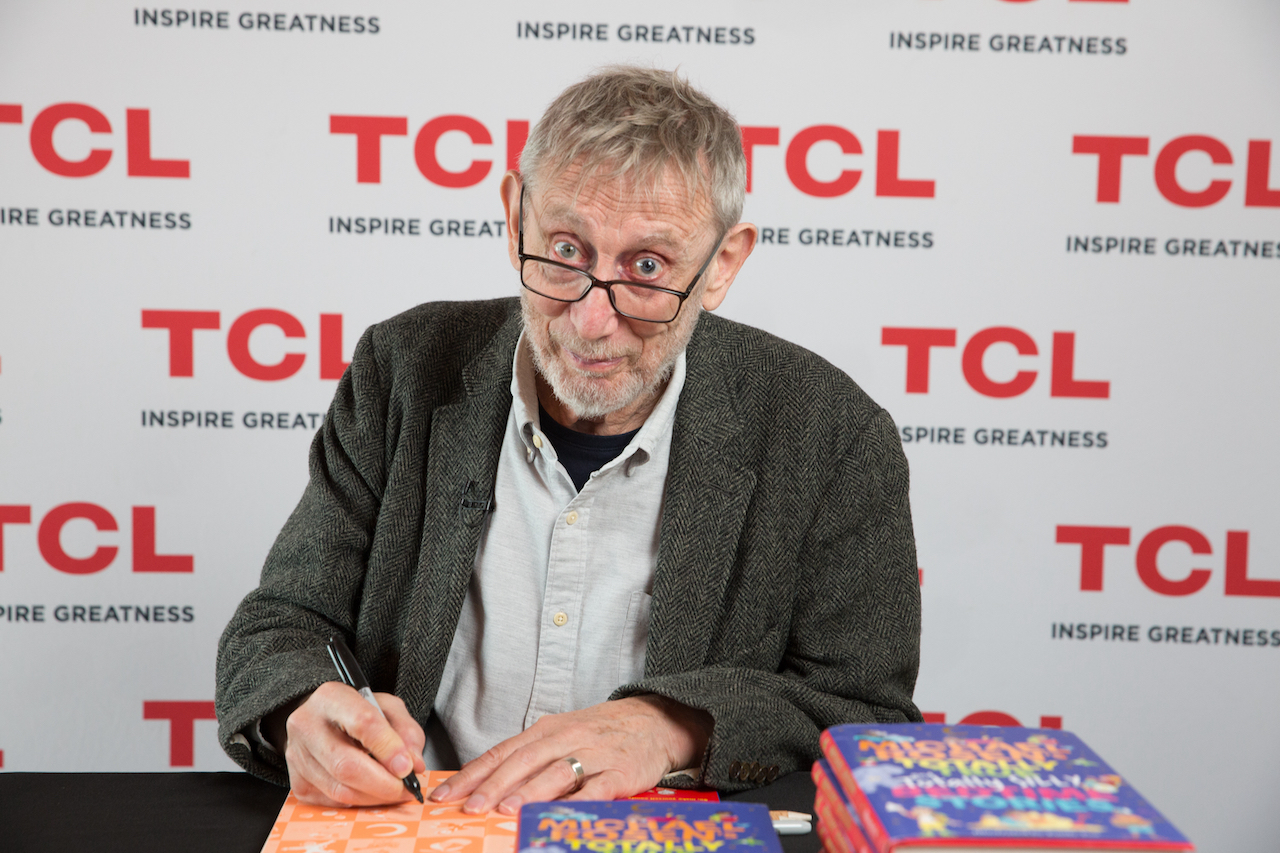Michael Rosen on writing (and writer’s block), outdoing AI and the power of poetry
An exclusive masterclass from the We’re Going on a Bear Hunt author...


David Attenborough. Judi Dench. Michael Palin. It’s a rare and illustrious group who make it to ‘National Treasure’ status, but poet and author Michael Rosen can certainly be counted among them.
The We’re Going on a Bear Hunt author is one of Britain’s most beloved children’s writers, and was appointed the Children’s Laureate between 2007 and 2009.
When not touring schools promoting literacy among children, he can be found teaching as professor of children's literature in the Department of Educational Studies at Goldsmiths, University of London. And having survived a near-death encounter with the virus at the height of the Covid-19 pandemic, 78-year old Rosen’s as well known now for his activism as his writing.
Though most at home among his library of thousands of books, Rosen’s been happy to embrace new forms of media and technology — his YouTube channel has almost 800,000 subscribers, and videos of his story and poetry readings have been viewed more than 140 million times.
He now acts as global ambassador for TCL, as the company promotes its reader-friendly TCL 50 Pro NXTPAPER 5G smartphone, which uses a unique screen toggle to bring the best of what both phones and e-reader devices have to offer, switching on the fly between full colour screen and a notification-free greyscale reading mode.
“It's a wonderful thing to be able to have a phone that basically combines smartphone with ebook,” Rosen told Shortlist as we recently sat down with him.
“Remember, you've got virtually the whole of world literature before 1925 available on the phone through Gutenberg and archive.org and through whatever is available in your local E library. And there are no distractions on this phone. So it's unlike when you're reading on a computer, dodging your up pops, menus, and your mates, social media, and all the rest of it. So you can lose yourself in it, and instead of carrying around two devices, you're carrying around one that’s easy to read.”
Get exclusive shortlists, celebrity interviews and the best deals on the products you care about, straight to your inbox.
We sat down to talk to Rosen about the art of his craft, the rise of AI, his relationship with technology and the things he does to ensure he’s in the right frame of mind to write his best work.
Settle in for a masterclass with one of the all-time greats...

ShortList: You're working with TCL on its new reader-friendly handset. Has it changed your relationship with reading?
Michael Rosen: Well, the basic thing is that it's just so much easier to read using it. I do read off screens as, either on my computer or my phones, but I was immediately struck by how easy it was. It was like reading paper, but with all the advantages of screen reading, where you can expand text big enough for my wobbly eyes and also get instant access to many books. I've got plenty of books here in this office room, but one of the nice things about screen reading is the speed that you can move through texts to find things — marking texts and searching as well.
I set it up with the help of my daughter, and she was immediately raving about it — I love that. So she pounced on it. In fact, I had to pull it out of her hands.
SL: Could you imagine yourself ever swapping out a paper library and going completely digital with your reading?
MR: I've probably got about five to 10,000 books. The problem is, some of those are unique that haven't been digitised. I can't see how I could get rid of those and then find them all online, if you see what I mean, because some of them are particularly to certain fields that haven't been digitised, and also they are more recent books. But I can imagine doing it, you know, to get by on a desert island that's got a signal, then I could quite happily cope.
SL: Can you remember the first book you ever bought for yourself?
MR: That's an interesting test. First book I ever bought for myself... I can remember buying one when I was 16 or 17…. but I must have bought books before then. Oh, wow. I relied on the library so much, and also, my parents bought us books…Yes! I had a whole thing about butterflies. Would you believe it? There you go. When I was about 10 and 11, I bought a book of butterflies. There you go. That's pretty amazing, isn't it? Excellent.
SL: Are butterflies still a passion?
MR: Less so I must say! I'm interested in insects in general. I'm very fascinated by insects. I'm sort of more interested in creepy crawly insects and eight legged things. But if I see butterflies I can't recognise, I will go, “Hey, what butterfly is that?”, and try to get my kids to tell me what it is. But lately I've widened it out to more different insects, bees, wasps, that sort of thing.
SL: When it comes to writing creatively, what's your routine now? What elements do you need to get in the zone to feel like you can sit down and do some good work?
MR: That depends on whether I'm writing about a memory, writing about something I'm imagining, or writing about something that I've just seen and heard. There are different modes for those different ways of writing.
If it's memory, then I have to zone in and really concentrate and concentrate on the kind of telling. How do I want to tell this? Am I telling it to a child, or to an adult? Do I want to make them laugh? Am I thinking about finding something ironic or sad or intriguing about it? So I'm asking myself questions as I'm writing it.
If it's a seen and heard thing, then sometimes I want to get to a truth in a very simple way, so it's unfussy and undecorated. And then, if it's imagination, then there's a lot of things to play about. If it's a story, how about plotting it? What's the story arc of the characters? What are their motives? And if it's a poem, then it might be quite fantastical, with imaginary beasts, imaginary places, imaginary landscapes, that sort of thing. So it just depends what kind of writing really
SL: Do you ever suffer from writer's block?
MR: Yes, and the way around it, I find, is to drop what it is that I'm trying! Don't struggle too long with it, go and find another kind of writing and then maybe come back to it when I've got a bit of objectivity about what it is I've written. Then I can see why I’m stuck.
If you look back at a piece of writing, you can sometimes see why you got stuck. Maybe it just wasn't very good, or you'd driven the characters into a corner that they couldn't get out of, or maybe you'd even misconceived the whole thing, and you've got to think of a different voice. Sometimes you've told the story as if you're the know-it-all narrator, and really you should tell it from the point of view of one of the characters. So sometimes going away, when you come back, switching it is easier. You find a way back in.
SL: Do you often find yourself just completely scrapping things then, and starting from scratch?
MR: Yeah, yeah, I've done that, and you have to be willing to. It's hard, because you're so sure when you started that it was going to be good. So the idea that you just drop something altogether, you can get a little separation anxiety. You don't want to drop it. “It was so good, it was going to be so good, but now it isn’t. Oh no. Oh well, maybe I'm no good.”
SL: Do you ever find that you've got something that's been sitting around in your head for years that you come back to, or is it always kind of a constant flow like, “what do I want to do today? What do I want to do right now?”
MR: No, you can come back to things, things that you've had one go at, maybe didn't come off all that well, and then you go back to it.
I have had an idea I think about again and again, it was a very strange thing. During the war, they gave money to local authorities and parks so that people could set up what they called piggeries. People could be given a little corner in a local public park to keep a pig because they wanted to up the amount of protein that people were getting — they were so worried about the state of the health of the nation, and people were near starving at times. And I can remember as a kid that in the corner of our local park, there was a slightly eccentric bloke behind a wall — loads of nettles growing around there, and he just used to stand there with his pig.
Of course, as kids, we just thought it was really freaky and weird. We just call him the pig man. “Let's go look at the pig man!” “Yeah, let's go over and look at the pig man!” And we go and stand there and look over the fence and go, “Hey, it's the pig man.” Of course he’d go, “You fuck off!” He didn't like us at all!
Anyway, I was looking it up the other day, and I thought, “why was there a pig man in the park in the middle of the middle of 1953 or ‘54 or ‘55?” And I suddenly came across a news item that said that they were setting up these piggeries. So there was a real reason.
Now, I've tried to write about this several times, and part of the problem is, there's no plot. And so, you know, is it one of my little, sort of dreamy poems where there's this strange man, this pig man? It would be interesting for me, but I’ve got a funny feeling it wouldn't really interest kids very much! Could I find an angle to write about that? So I keep trying.
SL: One of the big talking points around, well, everything in the world today is AI, artificial intelligence. What do you make of it as a prompt tool, or as a fully fledged writing tool for people who maybe find it difficult to write? Do you like AI? Do you find it challenging? Do you find it scary?
MR: At the moment, my main encounters with AI are on things like LinkedIn, when we get a message and then it puts up five automatic responses you could send: “Yeah, thanks very much. See you tomorrow”, that sort of thing. I look at these and feel nothing, how weird. Do they think I can't think of those myself?
I find myself sort of staring at them — not because they're kind of brilliant, clever witticisms, It's not as if it's got brilliant quotes or something. It's just like, “thanks very much”. And I think, well, I could write that, thanks very much. If I write, “thanks very much”, the person on the receiving end will know that all I've done is click on the AI option. So what it does make me do is try and think of something a bit more original, that they'll know I made up myself. So, in fact, it's almost as if the AI is a prompt for me to write something.
SL: Like a challenge to outdo it, to like, prove the human worth?
MR: I suppose, yeah, yeah. There's a whole other issue around writing poems, songs, stories, university, essays. I mean, that's a whole other area. Presumably you could get AI to look at a whole pile of books and say, “write me a book like that”. And it would, yeah, and you could send that in.
I mean, you know, there are some aspects of writing that are a bit mechanical, so you have to turn yourself at times into a bit of a machine. You could say, well, at this point, “I need a danger. I need some jeopardy. I need some peril.” Say, if your story is already set up around a child walking through a wood, you’ve got a limit on the kinds of peril that you can set for the child. It can't be, you know, a car runs them over because they're in the middle of a wood. So you've got wolves, and you've got scary animals, you've got getting lost, you've got night time, and then that's it.
In that sense, when you've got few options, artificial intelligence can come up with it. AI will produce some books like that with no problem. The interesting thing will be how writers come up with stuff that couldn't have been written by AI, and people realise that that’s really clever, original writing.

SL: What is part of your workflow? What are the things other than a pen and paper that you need when you get to sit down?
MR: I like to think that I've got a big chunk of time. I may not use it all, but if I know that I've not got long, then that sort of makes me a bit anxious, because I may not finish before the bell goes, and I don't like that feeling. So I won't start writing at, say, two o'clock, if I know the cleaners closes at 5pm. I like to think there's a spread of time ahead of me that is longer than the amount of time it'll take to write something, whatever it is.
Part of writing is the flow, and “if you know you're going to be interrupted, then the chances are, in my case, I won't start. I won't think, well, I write the first bit today and I write the next bit tomorrow”. I want to know I can flow for as long as it takes.
Philip Pullman, and I've heard others do the same, sets himself a very, very rigid timetable. They will write for X number of hours per day, and ideally it should be first thing. So they basically become very anti-social. Nobody can get in touch with them between 9am and 12pm.
But then they don't push it after that, they don't say, “well, I'll go and write some more”. They just know they've got this three hour slab that is untouchable. Nobody can get anywhere near them. And they say that that's a good discipline. And you may not write an awful lot, and you may do rewrites or whatever, but if you know you've three hours clear every day, then a year goes by quite quickly. I'm a bit different because I write and do so many very, very different things. So it's a sort of different system for me.
SL: One of the things you're well loved for is your poetry. But some people find poetry quite difficult. What would you say to someone who's maybe a first time poetry reader looking to learn how to appreciate that sort of form?
MR: When you read a poem, don't worry about what it means. Just ask yourself some personal questions, like, “does this poem remind me of anything? Does it remind me of anything that's happened to me? Does it remind me of another poem or story or song?” And just gently ask yourself, “Well, why would that be?” And then look to see if there are any bits of a poem that you like, or are there any bits of the poem that are puzzling. And then you can play a bit with it, but don't rest on it. If you're puzzled by it, chances are you'll get quite annoyed.
If you read something like a Shakespeare sonnet, there's always a bit that's a bit puzzling. So you can go to something like SparkNotes and get a kind of modern translation of it, and that helps a bit. There are plenty of poems with puzzles in them. And if you think of it, some poems, that's what they are — they're puzzles.
Some other poems are just meant to be a feeling. They're not meant to be anything. They're not meant to be about anything. They're not meant to be for anything. They're just expressing a sensation. And other kinds of poems are sometimes — and this is quite annoying for some — they're sort of about themselves. They're about the writer's thinking. And some people say, “I can't be bothered with that sort of poem”. And that's fine. Don't put yourself under any pressure.
If you're listening to, say, Bob Dylan, he can be quite opaque. A line like, “When you're lost in the rain in Juarez and it's Easter time too.” What? Why Juarez? And why does it matter that it's Easter? There's no point interrogating Bob Dylan about that. Just sit in the sensation of it. Just go with him. Don't worry about “well, wouldn't there be a difference to Easter and summer. And you know, why is he lost in the rain?” Don't worry about it. He is lost in the rain, and he's in a place called Juarez. Yeah, fine. That's that. He's just telling a little story. Just enjoy it.
Just let it sit. Sometimes people get anxious, because our whole training through GCSEs and A-levels and exams is to break it all apart. You must get the meaning. You've got to get the eggs out of the basket. Otherwise you're a failure. Well, that’s the wrong way to perceive this stuff. You've got to sit in it and let it brood, see what happens with it.

Gerald Lynch is the Editor-in-Chief of Shortlist, keeping careful watch over the site's editorial output and social channels. He's happiest in the front row of a gig for a band you've never heard of, watching 35mm cinema re-runs of classic sci-fi flicks, or propping up a bar with an old fashioned in one hand and a Game Boy in the other.